For nearly 50 years, our work out in the field and in your community has been core to The Piedmont Environmental Council’s mission. That work is about showing up, speaking out, and empowering our communities to show up and speak out—about land use and development decisions, land conservation, public policy, and more. And we continued that work this year, unabated in the face of a global pandemic, as government processes shifted online and people, spending more time at home, looked for ways to take an active part to improve their land or community. Our members’ support during 2020 was vital, and helped us continue our day-to-day work protecting the natural resources, rural economy, history and beauty of the Virginia Piedmont, without missing a beat.
As we end the year, join us in remembering some PEC highlights that were particularly joyous for us in 2020.
Bridges – New and Old
Bridges connect people and places. They can serve as a transportation resource. They can serve as a recreational resource. And oftentimes, they serve as both.
- This past year, watching the rehabilitated Waterloo Bridge placed back on its stone abutments across the Rappahannock River was the proud culmination of some seven years of championing the preservation, rather than demolition and replacement, of the oldest operating metal truss bridge of its kind in the Commonwealth.
- Earlier in the year, the installation of a new pedestrian bridge over Moore’s Creek was another dream realized. We helped plant the seed for this project back in 2017 when we brought a renowned urban greenway planner to Charlottesville to talk about the economic, health, and social benefits of greenways and community investment in bike-pedestrian connectivity. The Moore’s Creek Bridge closes a critical gap in the Rivanna Trail and opens the door for future bicycle and pedestrian connectivity projects in the area.
Restoring Headwater Streams for Fish and People
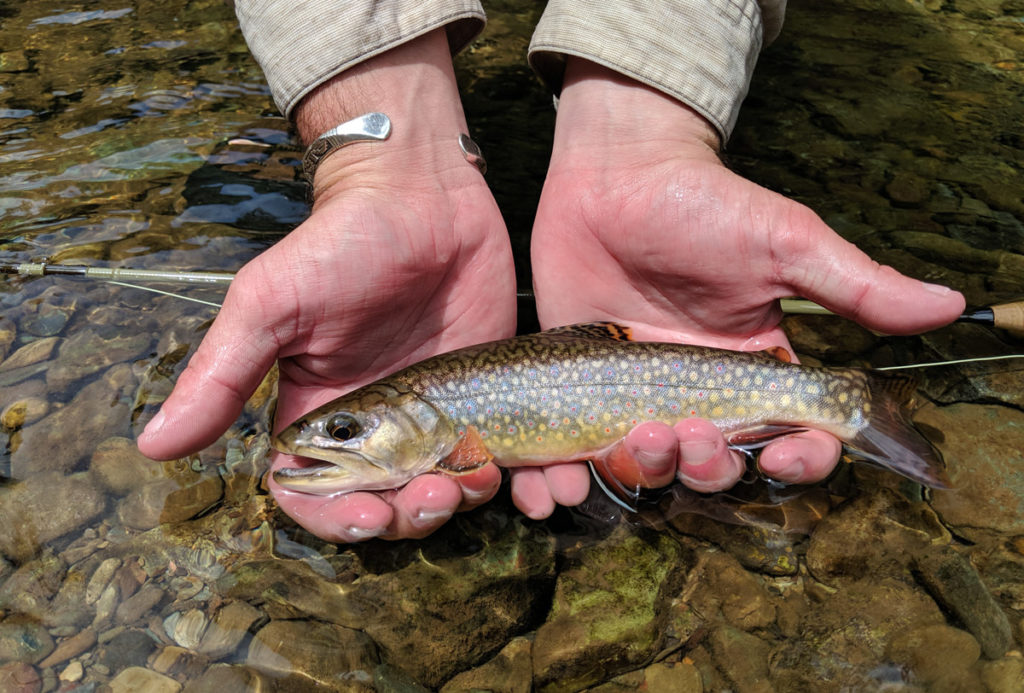
The job of our rivers naturally is to move the mountains to the sea. Dams and other barriers like culverts can disrupt natural stream flow, disconnect fish and wildlife habitat, and impair water quality. That’s why we’ve been working hard, along with partners, to remove several unnatural barriers and restore stream connections in our headwater streams.
- In fall 2020, as part of a monitoring effort with Virginia Department of Wildlife Resources fish biologists, we were thrilled to discover these efforts to restore fish habitat are working. At Whiteoak Canyon over Cedar Run, we found a trout paradise, with 22 brook trout counted downstream of the new bridge and 15 trout counted upstream. Several weighed in at 150-plus grams and over nine inches in length, a sign of a diverse age population, which is good for genetics and an indication of sustained habitat. At Bolton Branch in Rappahannock County, brook trout counts here have grown by 32-to-38 percent throughout the stream’s restoration area.
Other exciting findings at the site included two large American eels weighing more than 200 grams each. American eel are listed as a priority species for recovery in the Rappahannock-Rapidan Watershed and the Chesapeake Bay by the U.S. Fish and Wildlife Service due to dramatic losses of eel populations from dams on major rivers built in the 19th and 20th centuries. Find out more at pecva.org/trout.
Farm to Food Pantries
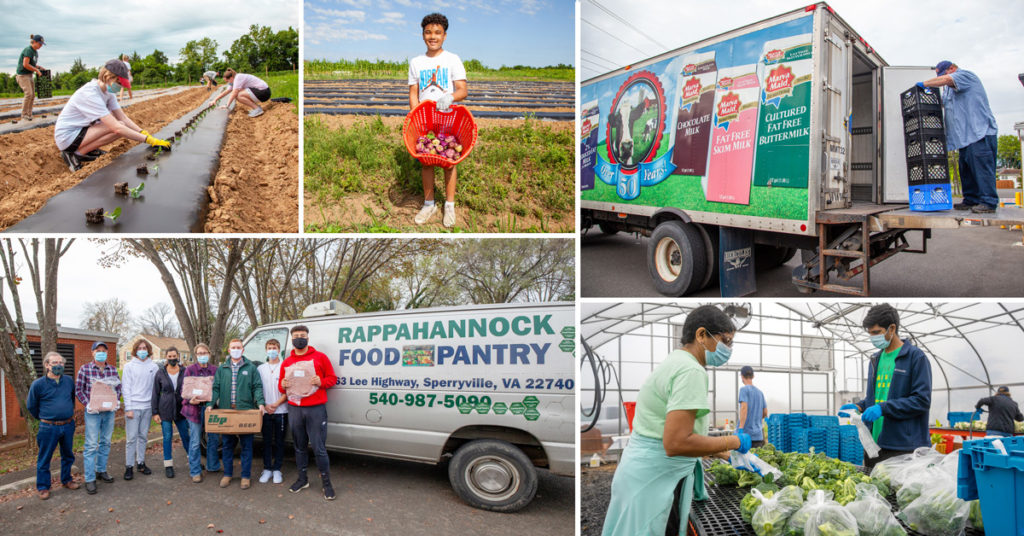
In 2020, with the help of partners and supporters, we’ve provided 25,000 pounds of vegetables, 25,000 gallons of milk, and more than 11,000 pounds of local beef and pork to food-insecure communities in our nine-county region of the northern Piedmont. That’s more than 50,000 pounds of locally-sourced products for local food banks, which has a very different impact on the local economy than shipping in 50,000 pounds of food from somewhere else.
- At the Community Farm at Roundabout Meadows in Loudoun County, what was initially intended to be a slow and steady increase in production this year turned into something much more, as PEC worked to respond to local impacts of Covid-19. Despite the limitations, the pandemic placed on our ability to host volunteers at At the Community Farm at Roundabout Meadows in Loudoun County at the height of the season, 470 volunteers from Winchester to D.C. still managed to donate 1,100 hours of service. We tripled both our production area and our donation goal this year, ultimately providing 25,000 pounds of produce to Loudoun Hunger Relief.
- Early in the spring, PEC became aware that pandemic-related closures and stay-at-home orders were affecting local dairy farms and local food pantries in unexpected ways. We set out to raise $10,000 in hopes of buying milk from the Maryland & Virginia Milk Producers Cooperative Association and donating it to local food banks, supporting both local dairy farmers and food-insecure at the same time. Media coverage about that initial dairy distribution generated waves of additional philanthropic support that opened the doors to get milk to even more food pantries throughout our nine-county region. By the end of 2020, PEC had raised more than $80,000 from individuals and organizations and provided more than 25,000 gallons of milk to food pantries in nine counties.
- We piloted a similar effort to connect locally produced beef with food pantries, and that effort has taken several different forms throughout the last six months of the year. Even with the unique processing and pricing challenges within the beef industry, the generosity of three local cattle farmers and several partner organizations have allowed us to provide more than 11,000 pounds of ground meat to more than a dozen different food pantries.
PEC Properties as a Public Resource
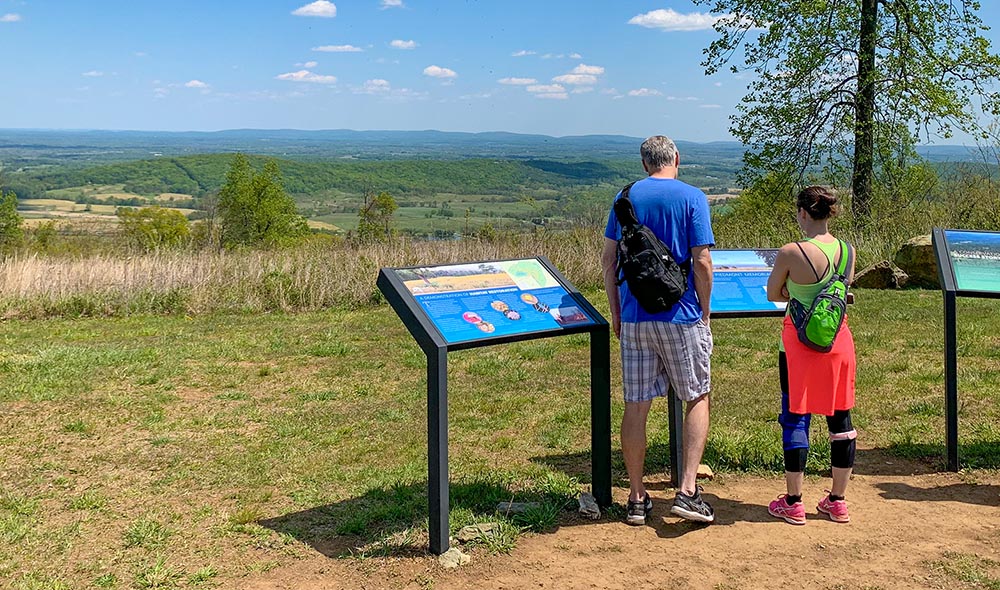
Experiencing the great outdoors is vital to human health and happiness and key to fostering a conservation ethic. And in a year characterized by social distancing and stay-at-home orders, outdoor places to walk, hike, bike, get to a river or stream or just sit and relax have never been more important. We have seen large increases in use of all sorts of places in our region, from national parks to PEC’s properties at the Piedmont Memorial Overlook and Roundabout Meadows.
- The 50-acre Piedmont Memorial Overlook in Paris, Virginia has one of the best views in Northern Virginia and is publicly accessible via Sky Meadows State Park. It’s a one-way 1.6-mile hike there via the Ambassador Whitehouse Trail, but many people make it a 4.6-mile loop that includes a stretch of the Appalachian Trail. From the overlook, one can look out across the heart of the northern Virginia Piedmont, a verdant agricultural landscape stretching 17 miles between the Bull Run Mountains to the east and the Blue Ridge Mountains to the west. To the south lies the Crooked Run Valley, extending toward Delaplane; to the north lies Clarke and Loudoun counties.
The view here is no accident. For decades, private landowners have worked together with land trusts to permanently protect their property, resulting in one of the largest blocks of conservation easements found anywhere in the eastern United States. - In 2020, PEC received the Governor’s Environmental Excellence Gold Medal Award for our conservation, stewardship, restoration and public engagement work at our Roundabout Meadows property at Gilberts Corner in Aldie, VA. At one time marketed as development parcels with vast commercial and residential potential, the 340-acre conservation area is a mid-point on the Journey Through Hallowed Ground National Scenic Byway and the threshold to the rural areas of Loudoun County. It now offers a chance to hike the original roadbed of the Old Carolina Road, volunteer at the Community Farm at Roundabout Meadows, and experience a wide range of historic, geologic and ecological sites, including our habitat restoration site.
- In the spring, we took ownership of the Gilberts Corner Farmers Market and surrounding property. We launched a partnership with the Loudoun Valley HomeGrown Market Cooperative which began managing the market on a weekly basis. They are also helping bring in an additional selection of local producers to enhance what was already a popular destination.
Story Mapping
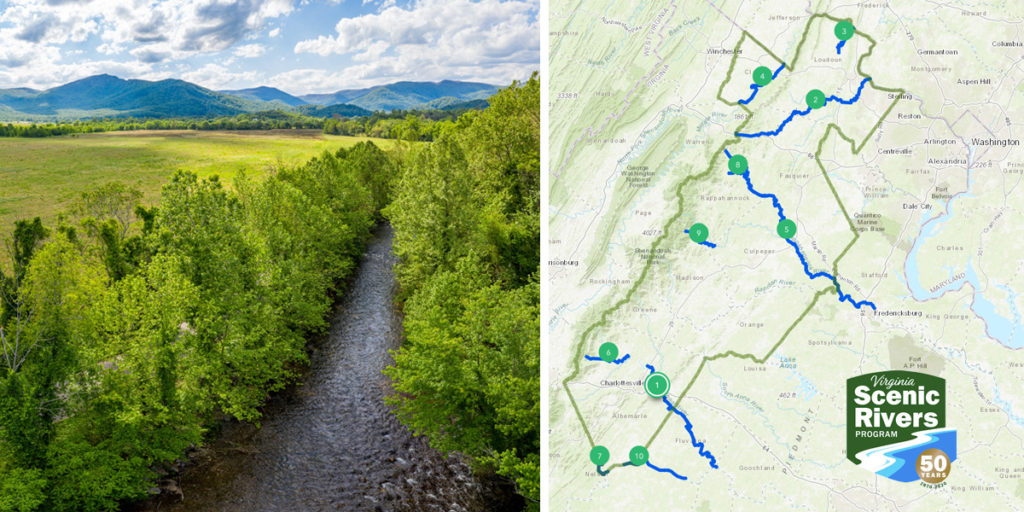
We all know that great visuals are a critical component of good story-telling. And that it really helps to know “where” someone is talking about. That’s where story maps come in. PEC staff and interns are learning to use this powerful online tool to illustrate the tremendous conservation work getting done in this region and orient community members to the amazing natural resources that surround us here in the Virginia Piedmont.
A few story maps we’ve created this year include:
- Clarke County, Virginia: Modeling Conservation and Responsible Growth in the 21st Century
- 50 Years of Scenic River Protection in the Piedmont: A brief history of the partnership between PEC and the Virginia Scenic Rivers Program and a look forward to the future of river conservation
- Rapidan River – Clark Mountain Rural Historic District: A Virtual Tour
Protecting the Land that Sustains Us
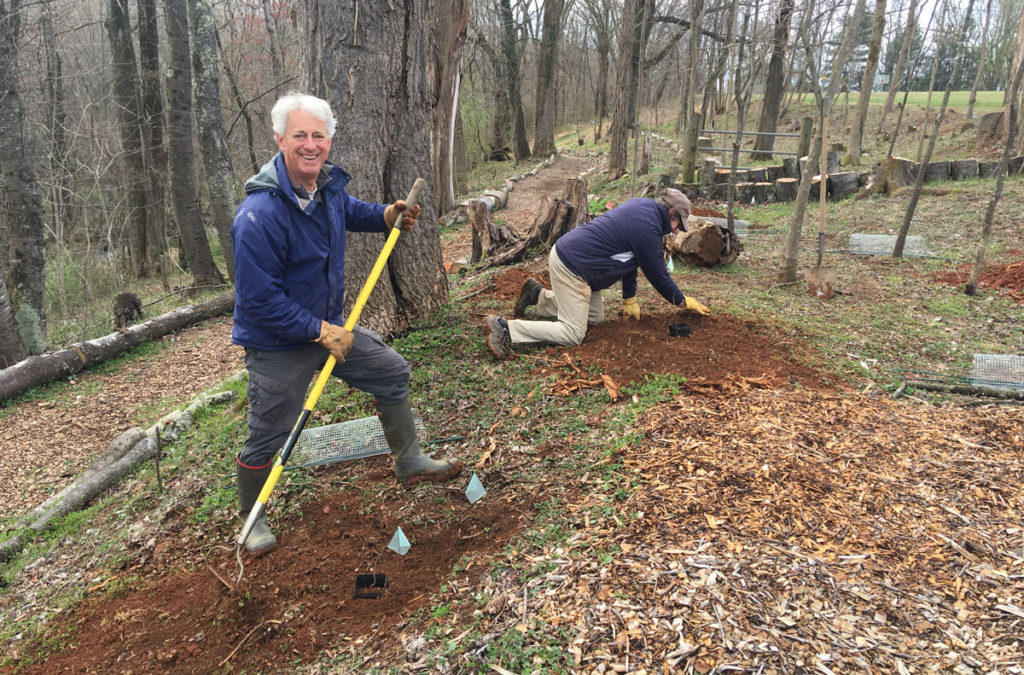
When we conserve and better manage land, we invest in our quality of life. And as Rex Linville, long-time PEC conservation field representative wrote this past spring, conservation is a “relentless pursuit” and an exercise in perseverance. This year, PEC staff have continued to push hard on projects that have been many years in the making, while moving swiftly to embrace digital outreach, meeting remotely with more than 125 landowners to discuss options for conservation.
- In 2020, we worked with the City of Charlottesville to expand the Heyward Community Forest, a 144-acre wild environment just outside the city’s urban center and next to the Ragged Mountain Reservoir. Once trails are completed in the forest, it will offer visitors a unique setting of boulder forests, a variety of habitat types, a creek with architectural ruins along the banks, wild blueberry patches, grasslands, and more.
- With the help of a $20,000 grant from PEC’s Krebser Fund for Rappahannock County Conservation, Rappahannock County Park has gotten a makeover, in a very natural way. Volunteers have pulled invasives, cleared trails, felled dead ash trees and picked up litter. Earlier this spring, the park’s advisory council partnered with Friends of the Rappahannock and PEC to plant 145 new native trees. An important section of the park’s right-of-way that borders Highway 211 has been planted with flowering redbuds for the spring and sugar maples that will boast bright red foliage this fall.
Improving Public Policy – Virginia Becomes 16th State to pass the Uniform Partition of Heirs Property Act
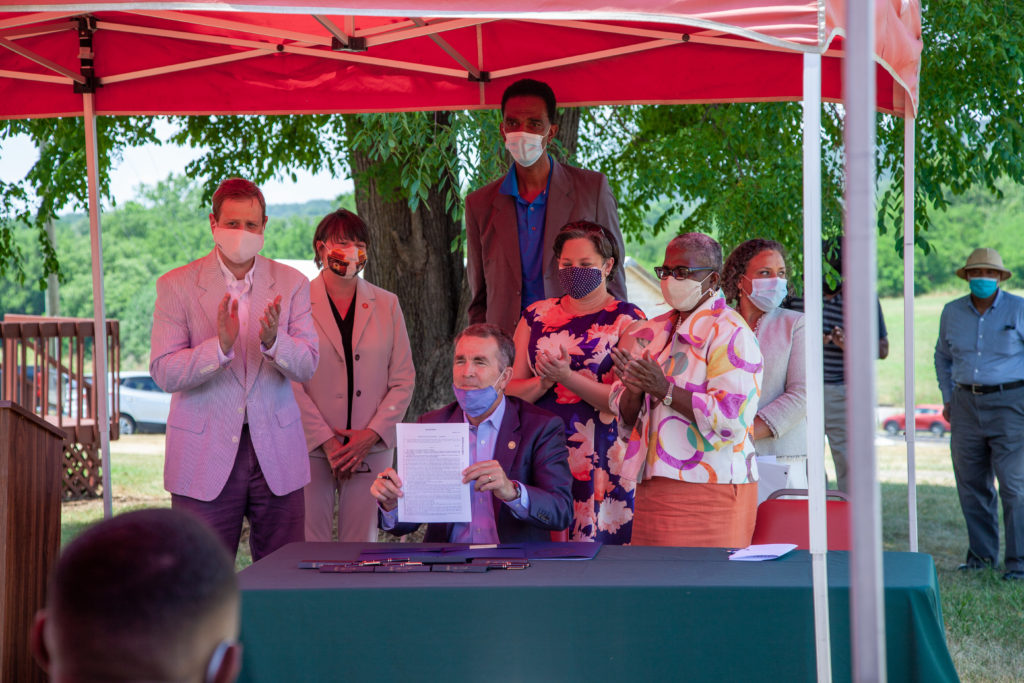
In the years between 1920 and 2017, the number of Black-owned farms in the U.S. dropped from more than 900,000 to 45,508; their acreage shrank from almost 19 million to just 2.5 million. Much of this land loss has been the involuntary outcome of our country’s broken way of dealing with land that’s informally passed down without a will.
- That’s why in 2020, Virginia proudly became the 16th state to pass the Uniform Partition of Heirs’ Property Act, which makes it a little harder for property to be sold out from under families who live on the land of their ancestors. Virginia Secretary of Agriculture and Forestry Bettina Ring calls the bill “an important first step toward ensuring more Virginia families can stay on the land they have stewarded for generations.”
The unanimous passage of the Heirs’ Property Act is the culmination of more than a year’s work by the Black Family Land Trust, which led a broad coalition of Virginia’s United Land Trusts, including The Piedmont Environmental Council, and others. PEC assisted in discussions with the Virginia Bar Association and Uniform Law Commission and played a key role in lobbying for the bill prior to and during session.
Learn more>>
Connecting Communities
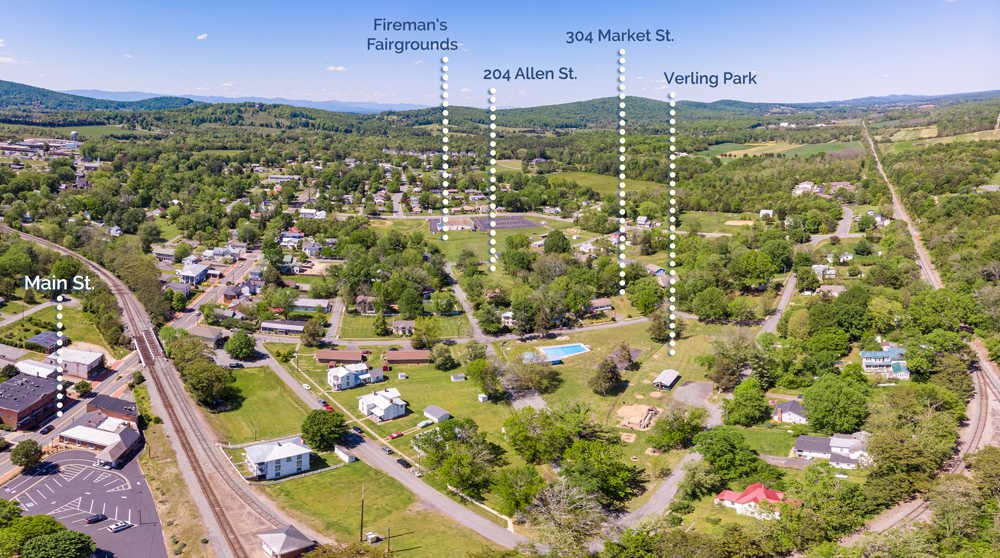
In this emotionally and physically trying year, many people turned to iconic parks, trails and green spaces for solace, exercise and restorative access to nature. Along the way, we saw clearly that we need more of them.
As we converge on our parks and trails like never before, we must remember that these places don’t happen by accident. Smart land-use policies will plan urban-rural development to include the creation of public access to parks and greenspaces. They are a key to thriving communities where people want to live and can live well.
Improving connectivity and access in 2020:
- With contributions from local foundations and community members, The Piedmont Environmental Council acquired the final piece of property needed to create park connectivity between Verling Park and the Firemen’s Fairground in Gordonsville, Virginia. Learn more>>
- In 2020, we pulled together an alliance of organizations that share a vision of a better-connected community for walking, biking and other forms of active transportation in Charlottesville and Albemarle County. Learn more and consider joining!
- In Warrenton, PEC donated $3,000 for right-of-way acquisition to help make possible an extension of the Warrenton Branch Greenway Trail. Late this year, Fauquier County awarded a contract for construction of the 10-foot wide, asphalt, shared-use path extending nearly one mile beyond its current endpoint.
Virtual Events
This year was certainly unlike any other, and required a major pivot when it comes to program (and fundraising!) events. While a few PEC events this spring and summer were canceled due to Covid-19, we worked hard to create digital alternatives and enhance engagement opportunities online. The biggest lift was probably the shift of our annual gala to this year’s Virtual House Party & Auction. A major ‘thank you’ to all who stepped up as event sponsors and everyone who took the time to bid on auction items. Your support was critical!
One of the unexpected benefits of the shift to virtual events, has been the ease of recording, which has made it possible for more community members to attend our “events” at their own convenience. It also made sharing resource links and documents a little bit easier.
- If you missed the recent Angie Schmitt Talks Safer Streets webinar, or Capturing the Rain: Green Infrastructure Options for HOA Common Areas, or one of the local updates for PEC counties, you can visit the Webinars section of our website to watch them now (or any time you’re feeling like it)!
- Our communications team and field staff also worked together to produce a handful of educational videos about ongoing projects, which you can find by visiting PEC’s YouTube channel >>
Interns, Volunteers, Fellows!
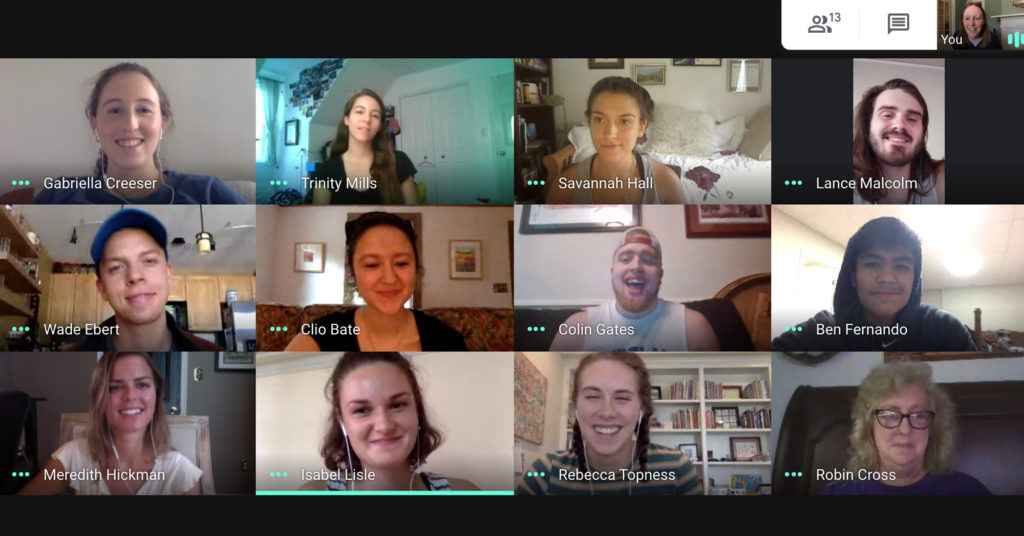
When Covid-19 hit in March, PEC was in the midst of planning our annual summer fellowship program and had already accepted the 2020 Class. We thought long and hard about whether to cancel the program, but ultimately decided to design and shift to a digital curriculum, working with this year’s enthusiastic Fellows to innovate and adapt. And we’re so glad we did. The 2020 Fellows were bright, nimble, and ready to learn about conservation, planning, and public policy. It was a great summer, and we’re looking forward to offering a similar program in 2021. Learn more at pecva.org/fellowship
In addition to the Fellowship program, PEC staff continued to work with volunteers and interns throughout the year in socially distant or digital capacities.
Two neat examples from 2020:
- This fall, we hosted eight George Mason University plant ecology students who embarked on a formal survey of the vegetation in the seven-acre wetlands preserve area of Roundabout Meadows. Their work will establish a baseline record of plant species for us, creating a checklist of plants within the meadow now against which we can track and measure the effects of restoration activities in place over time.
- Despite the pandemic, more than 450 people (many of them kids and young adults) learned more about farming and helped feed the hungry by pitching in at PEC’s Community Farm at Roundabout Meadows.
Stay tuned for new postings and opportunities at pecva.org/volunteer. And if you don’t already, sign up for email alerts or follow us on Facebook!
Thank you again for your continued support throughout 2020. Despite the unprecedented challenges that have been thrown at all of us, so many people have found a way to push through, both tackling current needs and working towards a better future.
If you haven’t already, please help us continue our work into 2021 through a tax-deductible year-end gift to The Piedmont Environmental Council.

